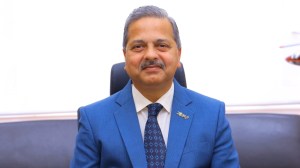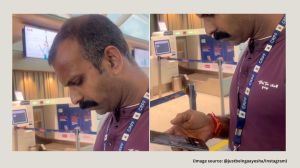Bush seeks Congress backing for India deal
US President, George Bush, who has made Congressional approval of the Indo-US nuke deal as a “high priority” for his administratio...

US President, George Bush, who has made Congressional approval of the Indo-US nuke deal as a “high priority” for his administration, on Tuesday met influential members of the Congress seeking their views and soliciting support on the civilian nuclear agreement with India.
“The entire meeting was all nuclear. That was the discussion all about,” Gary Ackerman, co-chair Congressional Caucus on India and Indian-Americans, told The Indian Express, after the meeting.
Seven “key” members each from the House and Senate were invited for the presidential meeting held at White House.
Bush was aided by the Secretary of State, Condoleezza Rice, and the Under Secretary of State for Political Affairs, Nicholas Burns, in his briefing to the Congressmen about trip to South Asia.
Among House members were Duncan Hunter, Chairman of Armed Services Committee; Tom Lantos, ranking minority member of the International Relations Committee; David Obey, ranking minority member of Appropriations Committee; John Kolbe, Chairman of Appropriations Committee; Ike Skelton, ranking minority member of the Armed Services Committee and Ros-Lehtinen, who is co-chair of the Congressional Caucus on India and Indian Americans along with Ackerman.
These are considered to play to “key role” in the Congressional committees, which would approve the Indo-US civilian nuclear agreement and the related legislative amendments to be carried out by the Congress.
A long-time friend of India and a strong supporter of the nuke deal, Ackerman said Bush briefed them about his trip to the South Asian countries and his meetings with the Prime Minister, Mammohan Singh, and the Pakistani President, Pervez Musharraf.
While Bush sought their support in seeking the deal approved by the Congress, some of the Congressmen are understood to have raised their concern over the Indo-US civilian nuclear agreement.
Ackerman, who outrightly supported the deal, informed the President its passage was not going to be that easy. “It is not an easy thing to accomplish in Washington when we are dealing with a nuclear issue,” Ackerman said. “He (Bush) quipped, thanks for the heads-up,” he added.
“This (civilian nuclear agreement) is an important way to offer an incentive to to a known nuclear power that demonstrated for a period of over 30 years that it was a responsible nuclear state that it was a non-proliferator,’’ he said.


- 01
- 02
- 03
- 04
- 05





























